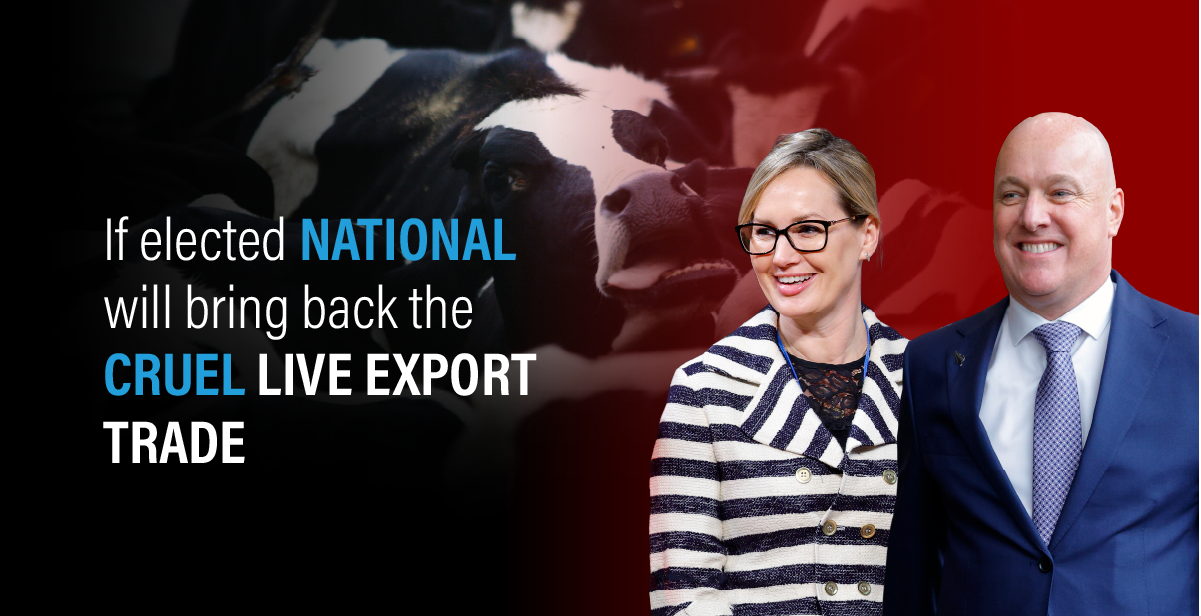
If elected, National and ACT will bring back the cruel live export trade
September 1st, 2023In 2021, the Government announced it would phase out the export of cattle, sheep, deer and goats. On 30 April 2023, live export by sea was officially prohibited in New Zealand.
Decades of evidence has indicated that animals suffer in the live export trade. In their review of the live export trade in 2013, animal welfare scientists Dr Clive Phillips and Dr Eduardo Santurtun stated, “There are significant risks to the welfare of livestock caused by transporting them in ships, especially over long distances”.
In 2019, ABC News in Australia reported that 5,000 New Zealand and Australian cattle were suffering in Sri Lanka. About 500 had to be euthanised. This prompted the New Zealand Government to review the live export trade.
During this review period, in 2020 the Gulf Livestock 1 sank in the East China Sea. 41 crew lost their lives, including two New Zealanders, and 5,867 cattle drowned.
The National Animal Welfare Advisory Committee recommended a ban on live export by sea, which was supported by animal welfare experts at SAFE, SPCA, World Animal Protection and many others.
Risks to animal welfare
Prior to the 2023 ban on live animal export by sea, animals were made to endure rough seas, injuries, and prolonged periods standing in their own excrement during transportation.
Transport by sea exposes animals to prolonged floor motion. Research in sheep has found that the animals demonstrate both behavioural and physiological signs that such movement causes stress.
Another study found that floor motion decreased rumination and lying time, and increased aggression and stress behaviour.
Treatment of animals in destination countries
Not only are there health and welfare concerns during transport, but the welfare and treatment of the animals once they arrive at their destination are likely to be worse than their treatment in New Zealand.
Animals were often shipped to countries with low or no animal welfare legislation. Former Chair of the National Animal Welfare Advisory Committee (NAWAC), Dr John Hellstrom, stated that:
“The reality is they are mainly going to large feedlot operations, where there is high mortality and poor fertility. The way they treat bobby calves shouldn’t be mentioned in public, and they don’t have any significant welfare protocols for transport or slaughter.”
There is no way for New Zealand authorities to ensure animals are being farmed and slaughtered overseas in accordance with New Zealand’s law. We cannot impose our animal welfare laws on other countries, just as other countries cannot impose their laws on us.
The economic impact of live export
In 2019 the live export industry made up a very small proportion of primary production in value. At the time, the total live export industry contributed only 0.51% to all primary production income and only 0.78% of the value of animal product exports. Live exports by sea only made up 23% of the industry.
Although livestock (cattle, goats, sheep and deer) are perhaps the most visible animals exported, chickens make up the majority of animals exported, with 2.1 million exported by air in 2019.
International reputation
Several countries are already following in New Zealand’s footsteps by also moving away from live animal exports due to the significant animal welfare concerns associated with this practice. Australia, Luxembourg, Brazil, and the European Union are all considering or have taken steps to phase out live animal exports, with high levels of public support for such measures.
Animal welfare standards have also been given consideration during Free Trade Agreement negotiations with the United Kingdom and the European Union.
Take action:
- Tell National and ACT you do not support their decision to bring back Live export by sea
- Sign our Petition calling for a Commissioner for Animals to ensure the rights of animals are upheld in Government
Authorised by Save Animals from Exploitation Incorporated (SAFE), 297 Durham Street, Christchurch 8013
 SAFE Animal Squad
SAFE Animal Squad